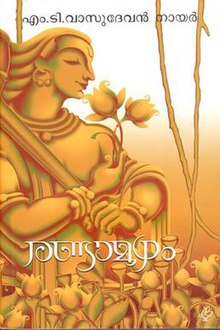


The cover for the 30th edition
| |
| Author | M. T. Vasudevan Nair |
|---|---|
| Original title | രണ്ടാമൂഴം |
| Illustrator | Namboothiri (First edition) |
| Cover artist | Vinaylal (First edition) |
| Language | Malayalam |
| Genre | Mythology, drama, historical fiction |
| Set in | Ancient India |
| Publisher | Current Books |
Publication date | December 1984 |
| Publication place | India |
| Media type | Print (Paperback) |
| Pages | 300[1] |
| Awards | Vayalar Award, Muttathu Varkey Award |
| ISBN | 81-226-0731-4 |
Randamoozham (English: The Second Turn) is a 1984 Indian Malayalam-language mythological drama novel written by the Indian author M. T. Vasudevan Nair, widely credited as his masterpiece.[2] The work won the Vayalar Award, given for the best literary work in Malayalam, in 1985.[3] It also won the Muttathu Varkey Award in 1994. The novel has been translated into multiple languages. It was translated into English as Second Turn by P. K. Ravindranath in 1997. Another English translation by Gita Krishnankutty published in 2013 is titled Bhima: Lone Warrior.[4][5]
The novel is a retelling of the Indian epic Mahabharata from the perspective of Bhima, the second Pandava. The story deviates from the traditional Mahabharata story as it avoids the divine elements of the ancient epic and re-represent the characters and events realistically. One of the reasons critics cite for the novel's cult following is its revisionism, that was a first in Malayalam literature. The book was translated into Tamil by Kurunjivelan as "Irandaam Idam" with the cover illustration by Trotsky Marudu.
A film adaptation starring Mohanlal was to be made and set to become India's most expensive film production of ₹1,000 crore (US$120 million) and the most expensive non-English-language film.[6] But the project has since been shelved.[citation needed]
The plot begins with the incident of Mahaprasthanika Parva where the Pandavas leave for the pilgrimage to Himalayas, forsaking all worldly possessions. The story runs through the eyes of Bhima who faces seemingly severe frustrations as a young man. Always destined to be second to his weak elder brother, Yudhishthira, in seniority and younger brother, Arjuna, in fame and popularity, Bhima is not given his due as the main architect of the Pandava victory over their cousins, Kauravas, in the Kurukshetra war, despite killing all the 100 Kauravas. The book unravels all the hardships and dilemmas encountered by Bhima which remain unnoticed. It explores the emotions of the mighty Pandava as a son, brother, husband, and father. The story brings to light his affection for his wife, Draupadi, and how unnoticed his acts of love remain. The narrative questions the mourning of Arjuna's son, Abhimanyu, when he is killed during the battle while trying to break the Chakravyuh formation, while Bhima's son, Ghatokkach, is led to his death by sacrificing his life to save Arjuna's life. Ghatokkach's sacrifice too remains unsung and everyone finds happiness in saving Arjuna. Towards the end, Bhima is shown as the only husband who stops and tries to stay with Draupadi in her last moments during their pilgrimage.
In 2011, director Hariharan announced his plan to adapt Randamoozham to screen, scripted by M. T. Vasudevan Nair himself with Mohanlal cast to play Bhima.[7] Later, V. A. Shrikumar Menon took the project again with Mohanlal in the lead. It was announced in April 2017 that the film adaptation will be produced by B. R. Shetty.[8][9] With its ₹1,000 crore (US$120 million) budget, the film is expected to be the most expensive film in Indian cinema, and one of the most expensive non-English language film. The film was to be shot in two parts.[10][11][12] Plans for the movie has since been shelved after M. T. Vasudevan Nair was upset with the pace at which the film was progressing and demanded Srikumar Menon to return the script.[13][14]
|
| |
|---|---|
| 1970s |
|
| 1980s |
|
| 1990s |
|
| 2000s |
|
| 2010s |
|
| 2020s |
|